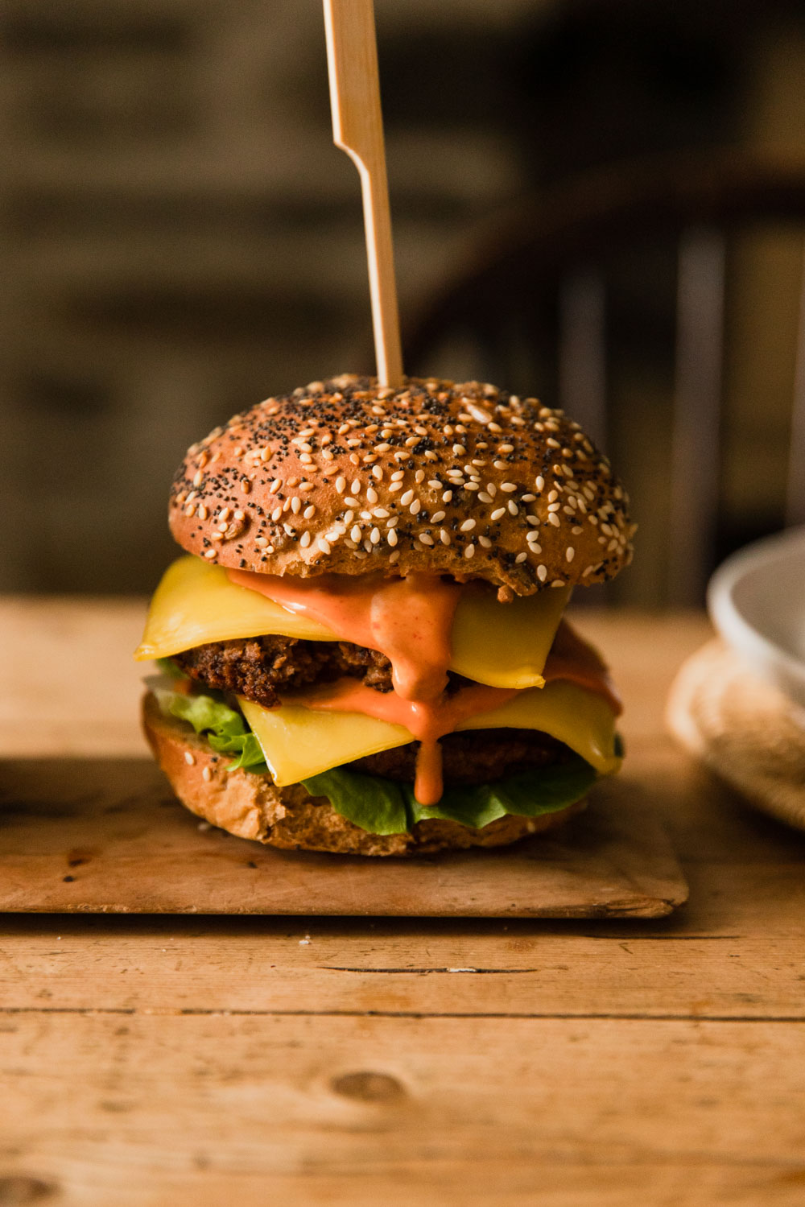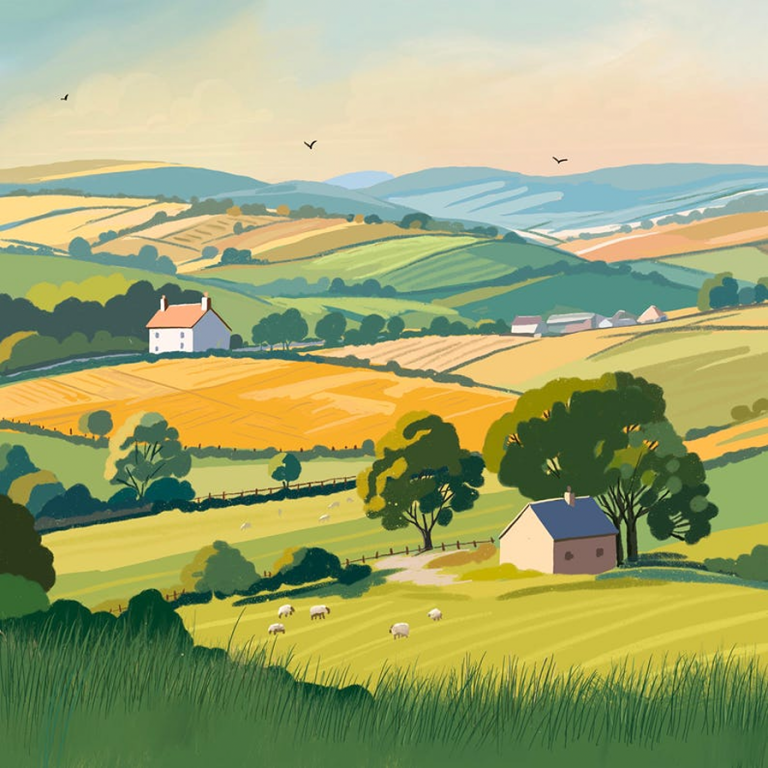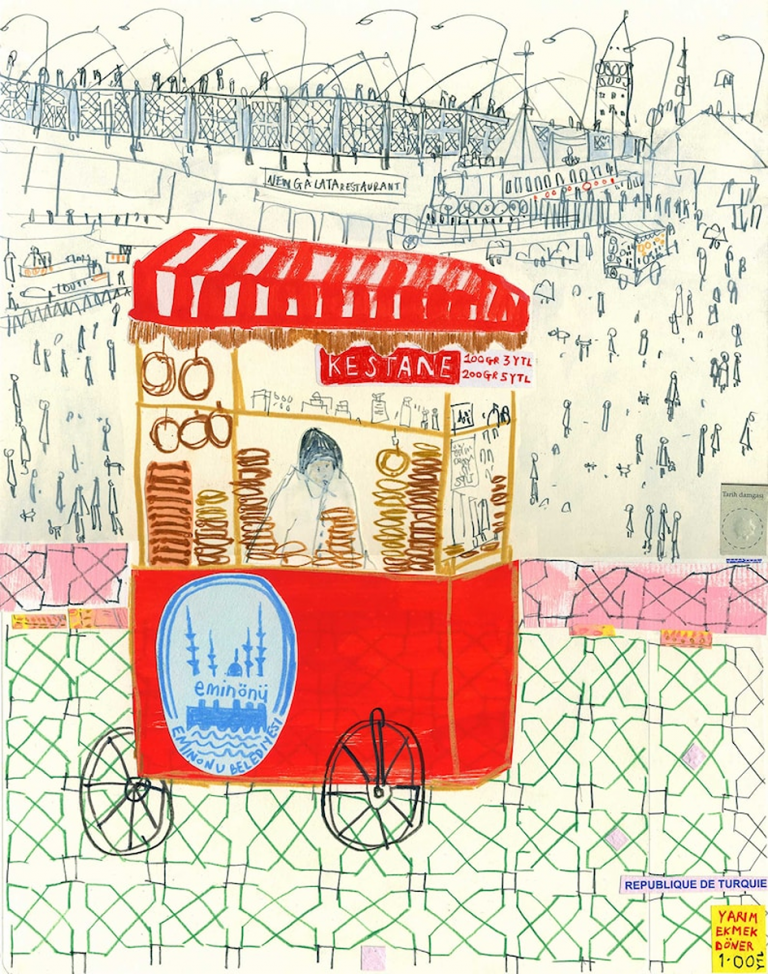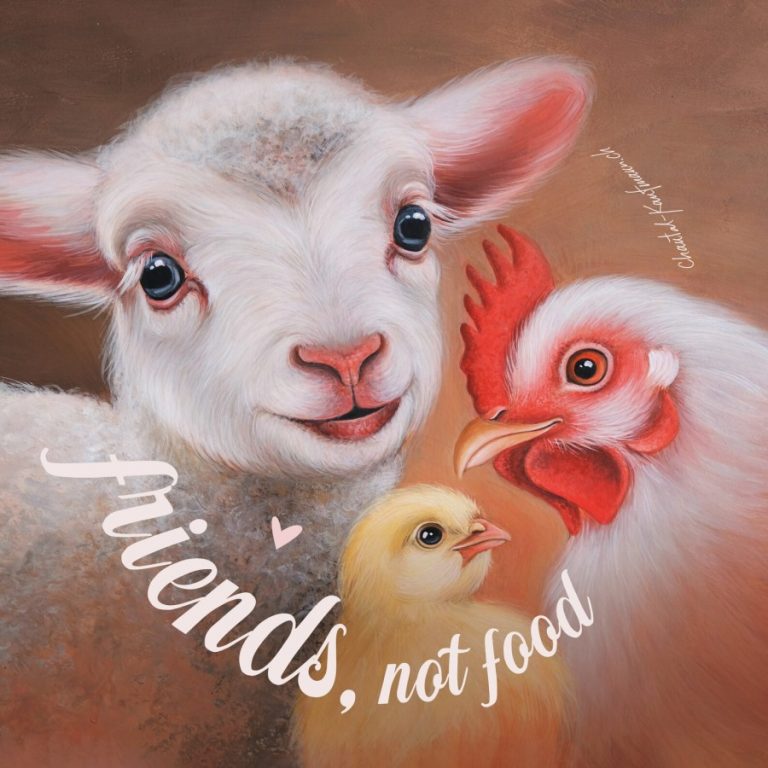
Few towns in England now are free from a branch of McDonald’s, despite only opening the first one in Woolwich, just 50 years ago. But despite media marketing, the brand’s profits have fallen by around $2 billion (they say due to cost of living – a Big Mac now costs double what it did).
Others say it’s because people are increasingly returning to local homemade food, and questioning ingredients (factory farms, rainforest beef, endangered Alaskan pollock along with litter issues).
Report fast food litter to Fix My Street. Councils have a legal duty (no matter who dropped it) to remove litter on public land. If on private land, they can either serve a Litter Abatement Order that ends up in court, or remove litter themselves, and reclaim the cost.
A Big Mac (created for steelworkers after a day at the mills) contains 25% of recommended calories, almost half your recommended fat intake, and most of your daily salt recommendations). And that’s without the fries (not even vegan abroad) and cola.
KFC has recently said it will be going back on its pledge to use slower-growing chickens (with better welfare) as it can’t find enough chickens? It also cooks its fries in chicken fat.
Burger King’s popular plant-based whoppers use the same grills that they cook the meat on, for ‘that same flame-grilled taste’ – which rather defeats the point.
A report by World Animal Protection found that nearly all fast food chains lag way behind on animal welfare scores. Greenpeace Australia reports that an area 2400 times the size of Sydney has been bulldozed in 5 years (killing koalas, wallabies, lizards and birds) to satisfy demand for beef (most bought by fast food chains).
Increasingly, some town councils are refusing planning permission, as local people beg for their towns to stay in local hands, and not be slave to more litter, junk food for their children and late-night fast food chain noise.
Case Study: Tavistock, Devon
Tavistock is a foodie town on the edge of Dartmoor (Devon) and full of markets, indie shops and stunning countryside. This town became the first in England, where the McDonald’s branch had to close due to lack of customers, and move their staff to Plymouth.
People here buy real ingredients, and make their own food. One local said ‘We feed our children properly here, so we did not need McDonald’s’.
Case Study: Marlborough, Wiltshire
This market town near the Malvern Hills is very traditional, and again had concern over the arrival of fast food chains, as it’s known for old bakeries and traditional pubs that serve local-ingredient lunches.
Sadly it has recently opened its first McDonald’s branch after years without, but an application to build a drive-thru near Trowbridge was refused, despite the plea that the ‘multi-million pound investment’ would provide ‘120 jobs for local people’ (that old chestnut – locally owned shops provide more jobs by ratio).
In 2024, another McDonald’s branch opened to great fanfare in the town (the photo including latex balloons outside: when released they drop in the sea and kill endangered sea turtles, who think they are jellyfish).
One response was ‘Do we really need more purveyors of junk food in Wiltshire?’ Another said the 75 jobs were almost certainly not at ‘real living wage’, and there would ‘no doubt be an explosion in litter’.
Case Study: Totnes, Devon
The quirky town of Totnes (the world’s first transition town, where people strive to be independent of oil through the use of community solar panels and local food) would not sit right with a McDonald’s.
Packed with quirky independent shops, you also won’t find a Costa Coffee, Starbucks, Burger King or KFC. Instead, locals buy locally-made sandwiches and snacks from the markets or local shops and cafés.
And rather than have a McDonald’s that ‘sponsors local football teams’, it has England’s first-ever zero waste shop, which is run by a former professional football player. Who went from Man United to making a difference (he also co-founded England’s first organic plant milk in returnable glass bottles).
He says if you ever told him he would go from playing at Old Trafford to becoming a shopkeeper before he hit 30, he would never have believed you!
Other towns and cities in England without a McDonald’s are:
- Truro (Cornwall) does not have a branch (though does have one ironically, near the local hospital).
- Nantwich (Cheshire) does not have one. Yet worryingly, there are campaigns to have one opened (even by some local councillors?)
- Ludlow (Wiltshire) is another ‘foodie’ town. It did not have a branch, but planners have now apparently caved, rather than supporting local food shops.
- Rutland (England’s smallest county) again did not have one until recently. That’s no longer the case, as there were just 55 objections.
Councils Increasingly Refusing Permission
In 2025, councils seem to be growing a pair! Fed up of local litter and big guns destroying all their local markets and shops:
McDonald’s was refused planning permission (two attempts) in Leeds, when trying to demolish a derelict pub to create a drive-thru. The application was refused on safety and public health grounds (it would have been within walking distance of two schools).
In Walsall (Birmingham), another planning application was rejected, on the site of a former pub and Chinese restaurant. Despite promising ‘120 jobs’, parking spaces, a bike rack, outdoor play area and electric vehicle charging stations, again locals were more concerned about community spirit, health and road traffic.
The application was originally approved, but when the council changed its mind, there was applause from the public gallery.
But McDonald’s is not giving up, often launching appeals using sponsored GPs and lawyers, who say that the chain is healthy as it ‘sells salad and sponsors local football teams’.
Yet children’s health campaigners are aghast, saying that we have enough issues already with the NHS having to fund and provide help for a growing number of children with type-2 diabetes, and adults with heart disease and high blood pressure.
One appeal lodged that the application should be allowed as ‘Children are likely to visit the restaurant with a supervising adult, who can support the child to make responsible food choices’. What world are these people living in?
McDonald’s Refused Permission (near a nature reserve)
In July 2025, Guildford Council refused planning permission for a new McDonald’s branch near a nature reserve. It said no to a proposed outlet at a fuel station in Tongham, which would have been next to a meadow reserve near Aldershot.
McDonald’s responded by saying that the new outlet would create 120 jobs, and it would protect local green space. There was very strong local opposition, including from MPs (including former health secretary Jeremy Hunt). It said that ‘there was a strong need for a restaurant in this area’ (no there is, nobody ‘needs to eat burgers’).
In fact, there now seems to be a trend where nearly all councils are refusing permission for new sites. The I Paper journalist Steve Robson, writes that there is increasing evidence that Britain is falling out of love with the fast food chain, with a £14 turnover drop last year, and and a huge backlash, with at least 12 planning permission requests for new restaurants refused, usually due to local people objecting.
Many towns are also objecting to proposals to turn some existing outlets into ones that are open 24-hours a day, citing concerns over light pollution and noise pollution (and likely more litter and night-time traffic).
The Financial Times reports that the chain says that ‘poorer customers’ are now declining their food, preferring to eat at home. One executive said (and he was serious in saying this) that ‘they’re trading down to eating at home’. Re-engaging the low-income consumer is critical, as they typically visit our restaurants more frequently than middle-and-high-income consumers’.
Trump is a McDonald’s Addict
It’s well-known that President Trump lives mostly on fast food, and is addicted to McDonald’s food. Many of us (including Lib Dem leader Ed Davey) were aghast when he and the royals sat down for a massive banquet for his recent state visit, when people in their tens of thousands in Gaza are starving.
Notwithstanding that issue, apparently Trump said on the flight back home ‘whatever the hell they served, I don’t know’. He obviously was not impressed that the dinner was apparently made with British organic ingredients, including Hampshire watercress, Kent raspberries and lightly-poached Victoria plums.
Trump is teetotal, so also was not impressed with the offerings of a cognac or whisky cocktail, wondering where his usual diet soda was.
What About the United States?

Montpelier, Vermont, is the only US state capital with no McDonald’s, showing that the idea isn’t just an English trend. Communities there also value independent shops, cleaner streets, and creative food options.
Arizona’s Sedona desert has some of the most stunning nature and wildlife on earth. So when McDonald’s inevitably decided to build a restaurant there, it was allowed.
And had the audacity to add the world’s only ‘green arches’ instead of yellow to ‘show they were stewards of the planet’ How about not getting your beef from rainforests, or investing in free-range meats?
VAtican City Rents land to McDonald’s

Whether you’re a fan of the Roman Catholic church or not, anyone should be shocked by the fact that one of the world’s most rich religious institutions, is now renting land to fast food chain McDonald’s, for a reported 30,000 Euros each month.
Not only is McDonald’s junk food, it causes immense suffering to factory-farming animals (have they never heard of St Francis of Assisi – the patron saint of animal welfare?).
The building that the fast food chain sits on is owned by the Vatican, located just outside the city walls. To be fair, some Cardinals (one up from a bishop, one down from the Pope) opposed it, but had no power to stop it. Many local people (Vatican City is its own country, independent from Italy) also were not happy.
Administration of the Patrimony of the Apostolic See is a bit of a mouthful. This is apparently the Vatican ‘estate agency’ responsible for buying and selling and leasing land. And the reason given for renting it to McDonald’s, was confirmed as ‘the food chain’s bid was significantly higher’. This is real? Jesus? Simple living? Peace? Honesty?
Blessed are you who are poor, for yours is the Kingdom of God (Luke 6:20)
The APSA has to publish its accounts by law. In 2023, it made 45.9 million Euros in profit.
McDonald’s hands out free cheeseburgers to homeless people, to try to win people round. It would be better placed leaving the Catholic church to address responsibility of having homeless people on its doorstep, when it’s one of the richest organisations in the world.
Which Countries Have No McDonald’s?

Quite a few countries worldwide have no McDonald’s. People cook their own food! The most well-known example is Iceland. Other countries without a branch of McDonald’s are:
- Macedonia (unknown reasons)
- Jamaica and Bermuda (people don’t really eat burgers)
- Bolivia (they prefer their own food)
- Montenegro (people eat local food)
- Iran and Iraq
- The Yemen
- Zimbabwe
- North Korea (for obvious reasons)
A lot of ‘popularity’ is also due to expensive marketing. One major fast food chain’s review on TrustPilot describes a meal as a ‘fast disappointment’ with ‘cold stale fries and a burger that looks like it’s been in a food fight’.
McDonald’s boast of using free-range eggs, organic milk and ‘British meat’ (which means not much in welfare terms). Pork is from RSPCA-assured farms (Brian May recently resigned as president, due to shocking footage). And tellingly, they don’t mention ‘food miles’ in their ads. their ads. Their website vaguely states:
The lettuce is sourced locally ‘when in season’ but otherwise comes from Spain, Holland and France, and chicken is from Europe.
England’s Vegan Fast Food Chains
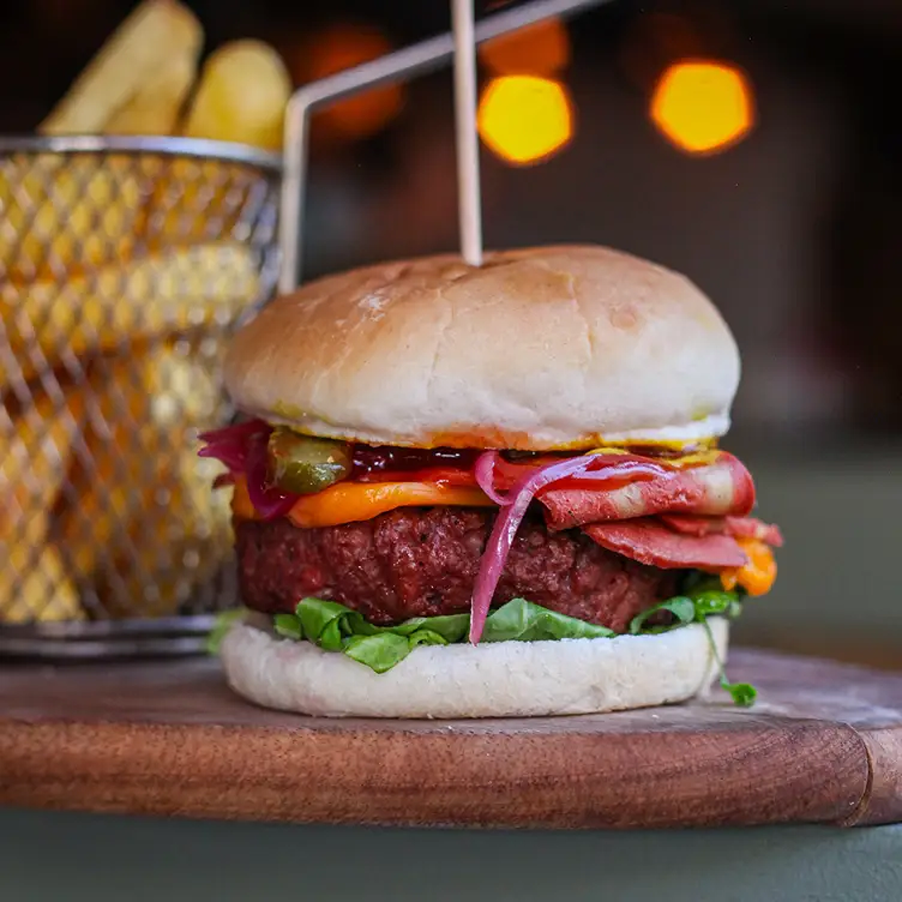
After closing down due to high rents, happily London’s Unity Diner (which uses funds to help its own Surge Sanctuary for abused animals) has reopened as a vegan fast food chain and carvery!
Some chains have diversified due to rising costs, and switched to home delivery only. An example is Manchester’s Vegan Shack, known for its burgers. The menu includes:
- Breakfast ‘Cheese & Bacon’ Bagel
- Vegan Sausage Breakfast Muffin
- Vegan Cheese Shack Burger
- Vegan Fillet Faux Fish!
- Chick’n Burger
- Chick’n Wings or Nuggets
- Shack Fries
- Soft Serve Vegan Ice Cream
Temple of Seitan offers a huge range of American-inspired burgers (‘meat or chicken’) along with regular sides. It has locations in Camden and Hackney, plus you can order home delivery if you live in York, Cambridge, Liverpool (or Edinburgh in Scotland) The menu includes:
- Nashville Hot Burger
- Buffalo Glaze Burger
- BBQ Bacon Burger
- Grilled Chick’n Burger
- Hot Dipped Fillets
- Temple Wings
- Döner Wraps
Also read about vegan fish and chippies, and vegan kebab chains!
Make Your Own Vegan Fast Food
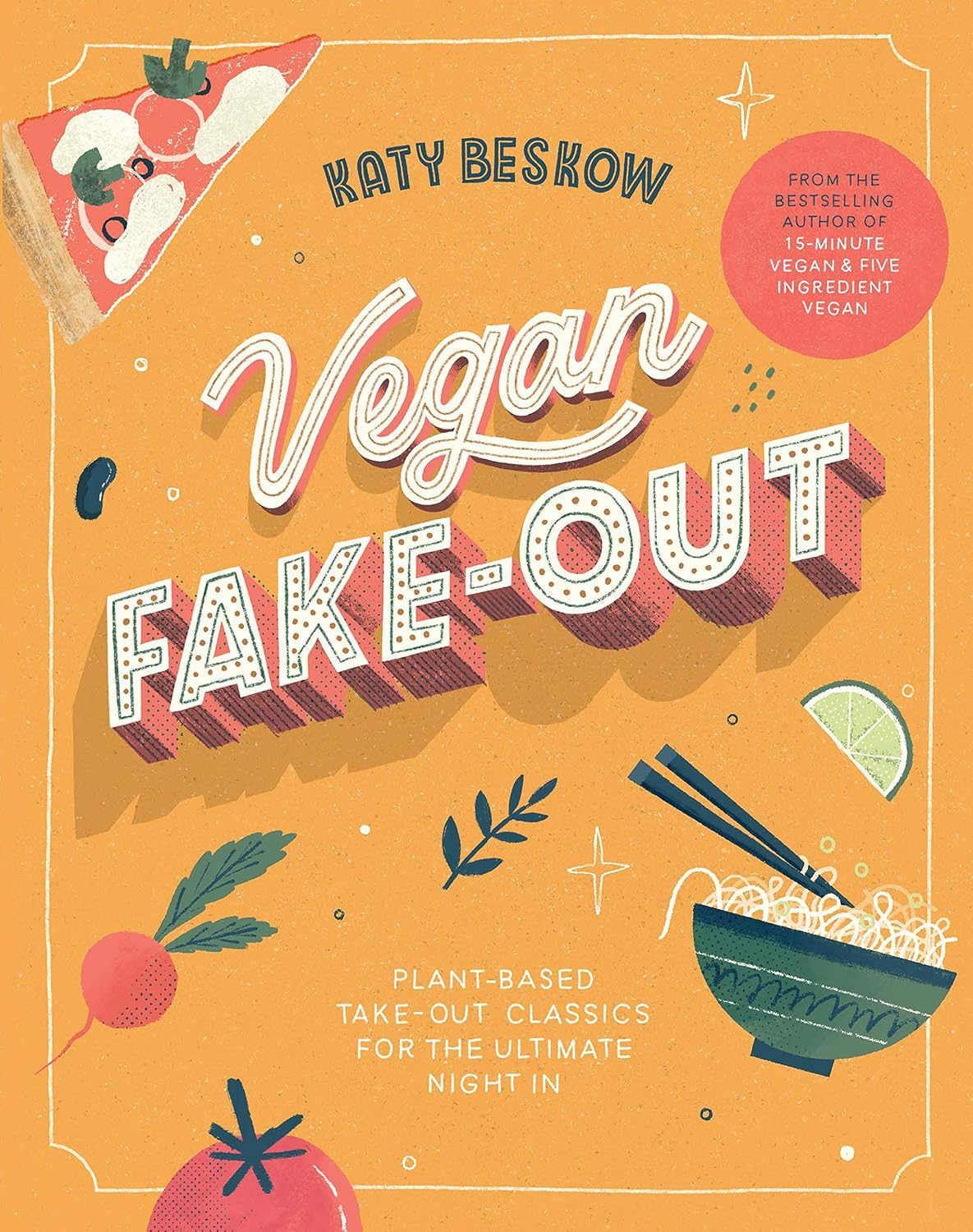
Vegan Fakeaway is a fantastic and simple (beautifully designed) book, packed with no-nonsense recipes to replicate all your fast food favourites. You can make these meals in less time, than it takes to order take-out, and without the expense and plastic packaging too.
Avoid sausages for children and choking hazards (or slice lengthwise, then lengthwise again for older children). Keep away from pets, due to salt and faux meats. Read more on food safety for people and pets.
Don’t give leftovers to garden birds or wildfowl, due to salt and fat (can smear on feathers, affecting waterproofing/insulation).
The chapters are divided into the kinds of takeaways that are popular in England:
- Chinese food
- Italian food
- Indian food
- Middle Eastern (kebabs etc)
- American fast food
Recipes include:
- Hong-Kong-style Sweet & Sour Cauliflower
- Crispy Vegetable Spring Rolls
- Sesame Spring Rolls
- Bean Curd & Broccoli in Plum Sauce
- All-in-one Biriyani
- Sicilian-style Pizza
- Falafel Flatbreads
- Chilli Burritos
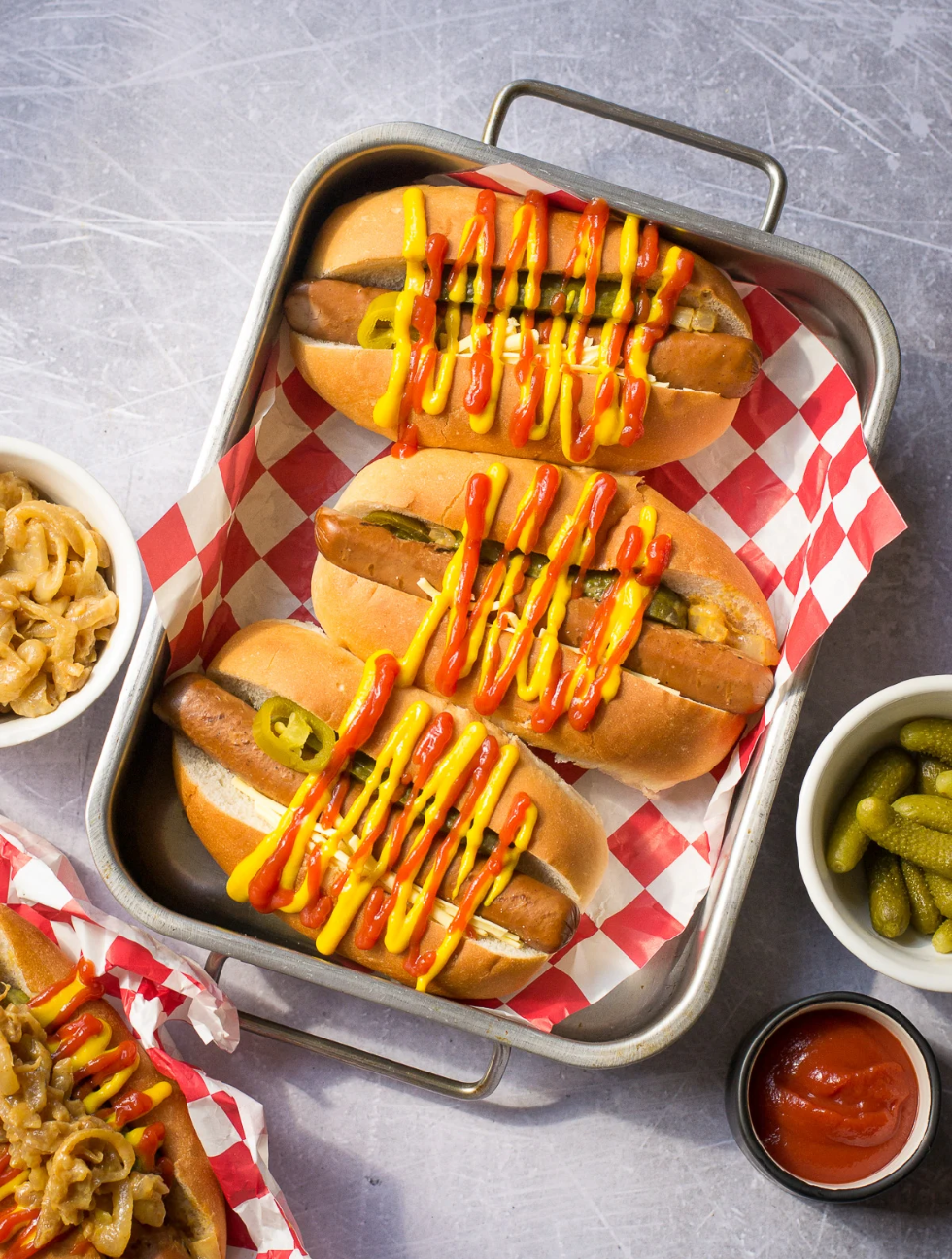
These vegan hot dogs (The Veg Space) are easy to make, using ready-made vegan sausages. You can also add some smoky vegan cheese, for that authentic New York flavour. Or even gherkins.
